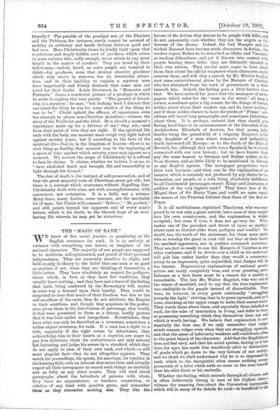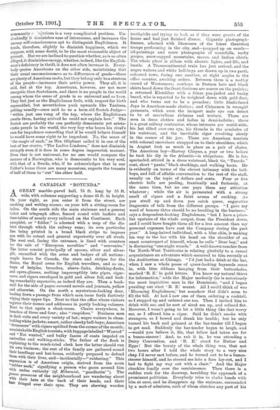THE "MAGIC OF RANK."
WE know of few social puzzles so perplexing as the English reverence for rank. It is so entirely at variance with everything one knows or imagines of the national character. The majority of our people are supposed to be stubborn, self-opinionated, and proud of their personal independence. They are unusually sensitive to slight, and hold stoutly in theory to the belief that one man is as good as another, if not, when they are thinking of themselves, a little better. They have absolutely no respect for pedigree, about which, in fact, as they have few traditions, they usually know nothing; and they have not a trace of the feeling that rank, being conferred by the Sovereign's will, makes in some way a demand upon their loyalty. They would be surprised to hear that much of their freedom was due to the self-sacrifices of the caste, they do not attribute the Empire to their exertions, and though they acquiesce in the prefer- ence given them in the distribution of patronage, they would, if that were presented to them as a theory, loudly protest that it was both unfair and inexpedient. Nevertheless, they have what can only be described as a reverence, sometimes a rather abject reverence, for rank. If a man has a right to a title, especially if the right comes by inheritance, they acknowledge him in their hearts as a superior, are eager to pay him deference, think his exclusiveness not only natural but becoming, and judge his errors by a standard which they do not apply to men of their own rank, and which—a still more singular fact--they do not altogether approve. They watch his proceedings, his sports, his marriage, his tumbles in the hunting field, with an interest that never tires, and actually expect all their newspapers to record such things as carefully and as fully as any other events. They will read aloud paragraphs about the betiothals of persons with whom they have no acquaintance, or business connection, or relation of any kind with positive gusto, and remember them as they remember nothing else. They like the heroes of the fiction they devour to be people with titles, ass do not, apparently, care whether they are the angels or the demons of the drama. Indeed, the bad Marquis and the wicked Baronet have become stock characters in fiction; the readers expect Dukes to be described as idiots, and Viscounts as used-up debauchees ; and yet if thrown into contact witl people bearing those titles they are distinctly elevated in their own esteem. They are far more eager to hear about them than about the official magnates whose characters really concern them, and will skip a speech by Mr. Ritchie to gloat over some entertainment given by the Marquis ef Carabas, who has abstained from the work of government as a little beneath him. Indeed, the feeling goes a little farther than that. We have noticed for years that the managers of news- papers which cater for the "man in the street-" all keep a corner, sometimes quite a big corner, for the doings of foreign nobles, about whom their readers can, and do, know nothing; and if those nobles chance to have the prefix of "Prince" sub- editors will insert long paragraphs and sometimes historiettes about them. It is, perhaps, natural that they should give flaring head-lines to an announcement of the betrothal of the Archduchess Elizabeth of Austria, for that young lady, besides being the grandchild of a reigning Emperor, is the only daughter of a man whose romantic and melancholy death interested all Europe ; or to the death of the Doke of Berwick, for, although that noble was a Spaniard, he is closely connected with our own history; but we have known them pay the same honour to German and Italian nobles as far from thrones, and as little likelY to be mentioned in history,. as any English squires. The newspaper. proprietors know their own business; and what can be the explanation of an interest which is certainly not produced by any desire for in- formation, our people, as a rule, being absolutely indifferent to all Continental personages except Kings and statesmen or soldiers of the very highest rank ? They know less of Dr. Miguel than of Sir Harry Vane, and could no more repeat the names of the Prussian Cabinet than those of the first six Popes.
It is all snobbishness, explained Thackeray, who was sup- posed to be not only a great satirist, but a-man of deep insight into his own countrymen, and the explanation is widely accepted ; but, even if true, it does not go vey far. What makes one of the proudest and freest of races so snobbish about rank as distinct alike from pedigree and wealth? We doubt, too, the truth of the statement, for these same snobs who so worship the great in rank will not bear at their hands the smallest oppression, nor in politics overmuch resistance. They are just as ready to sue the Marquis of Carabs,s as any other customer, and if he drives over a child in his motor-car will pelt him rather harder than they would a commoner, owing to an impression, quite unjustified, that Judges will be too lenient. Depreciatory explanations of national peculi- arities are rarely completely true, and even granting snob- bishness as a fact, there must be a reason for a quality so remarkable. The late Mr. Walter Bagehot, who was one of the wisest of mankind, used to say that the true explanation was creditable to the people instead of discreditable. They were, he believed, in every grade continually "struggling towards the light," striving, that is, to press upwards, and, as it were, clutching at the upper rungs to make their ascent easier. They watch those above them, and especially those labelled as such, for the sake of instruction in living, and defer to them as possessing something which they themselves have not and which is worth having. We believe that explanation is sub- stantially the true one, if we only remember that vulgar minds remain vulgar even when they are struggling upwards, and that the sense of inferiority weakens self-confidence, often to the great injury of the character. Add that the Englishman does not feel envy, and that his social system,
done for ages, has made him sensitively alive to distinctions of grade which go down to the very bottom of our society, and we think we shall understand why he is so impressed by lasting as it has rank, which to the thoughtful often means nothing exeePt possession of a label which adds no more to the man himseN than his shirt-front or his umbrella.
Whether the feeling, which extends through all classes, and is often ludicrously strong in men of the highest class
witness the amazing fuss about the Coronation ceremonial, which will in many of its details fix rank—is beneficial to the community 0- -njurious is a very complicated problem. 'Un- doubtedly it diminishes ease of intercourse, and increases the uneasy self-consciousness apt to distinguish Englishmen. It tends, therefore, slightly to diminish happiness, which we suppose, with some doubt, to be the most reasonable object of pursuit. But we are inclined to question whether, as is so often alleged, it diminishes energy, whether, indeed, like the English- man's deficiency in thrift, it does not often increase it. Every- body quotes Americans on the other side, maintaining that their usual unconsciousness as to differences of grade—there are plenty of American snobs, but they belong only to a stratum of the people—increases their active power. They all, it is said, feel at the top. Americans, however, are not more energetic than Scotchmen, and there is no people in the world among whom the sense of grade is so universal and so keen. They feel just as the Englishman feels, with respect for birth superadded, but nevertheless push upwards like Yankees, getting usually—once said to us a keen old Scotch Judge— "within just one rung of the top, where the Englishman awaits them, having arrived he could not explain how." The Scotch are probably the one perfectly democratic yet aristo- cratic: people in the world, the very boy who boxes his rival's ears for impudence conceding that if he would behave himself he would have some right to be impudent. No, the sense of the magic of rank," as Mrs. Oliphant called it in one of the best of her stories, "The Ladies Lindores," does not diminish strength even if it does in some degree impoverish manner. Even that is not universal, for no one would compare the manner of a Norwegian, who is democratic to his very soul, with that of a Swede, who, if he acknowledges that in our Father's house there are many mansions, expects the tenants of half of them to " cut " the other half.















































 Previous page
Previous page